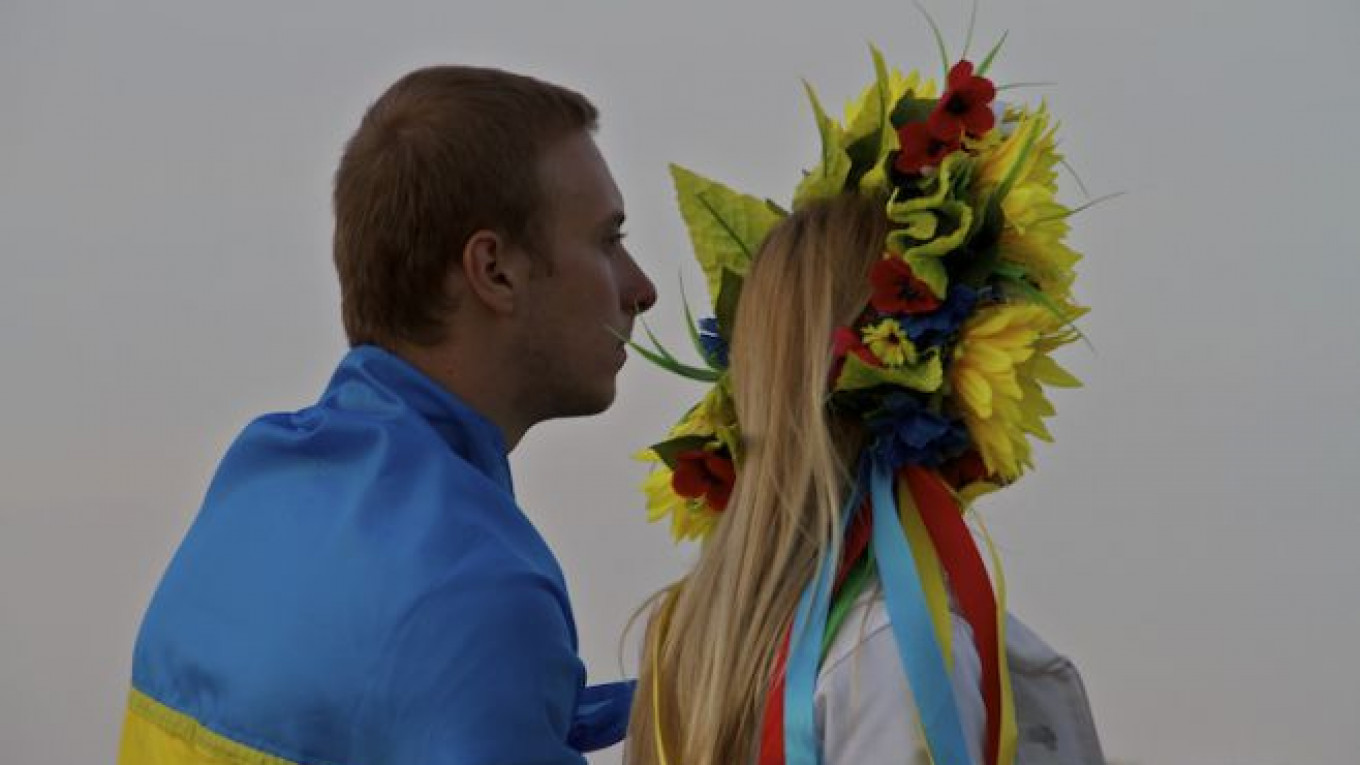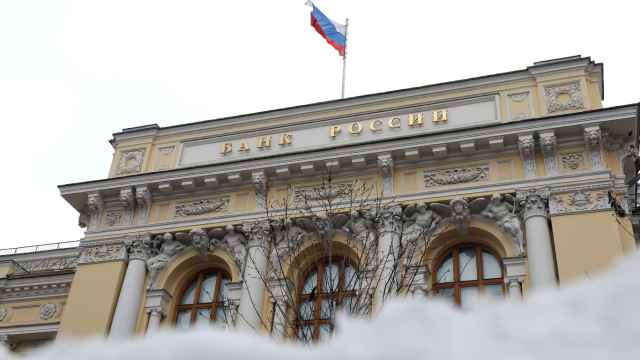It wasn't a good idea to drive a car with plates from Donetsk. Driving through the streets of Kiev, Lesia Litvinova, a volunteer with one of the local organizations helping new arrivals from the Donbass, felt overwhelmed. Hearing insults has now become part of her experience on the road.
Ever since the Euromaidan protests early last year and the beginning of the war in the Donbass — which has been accompanied by a huge inflow of internally displaced persons (IDPs) into the rest of Ukraine — the old prejudices about the inhabitants of the eastern part of Ukraine have been on the rise.
Accused by many of supporting the Russian-backed separatists, people from the Donbass have often found it difficult to adjust to the realities of their new cities. Blamed for the war, they arrive in new towns often without any contacts and have nowhere to go, which reinforces their feeling of isolation.
But according to Lesia Litvinova, those who have decided to move to Kiev and other cities far from the war zone are usually those who don't support the actions of the separatists and have run away from political persecution and war.
The Ukrainian government, faced with war in the east as well as economic difficulties, has not made any coordinated effort to tackle the prejudices and stereotypes against the IDPs or disseminate information related to their displacement.
The efforts to improve the general situation of the IDPs have also been largely inadequate, with volunteer organizations virtually taking over the role of the state in supporting the IDPs.
Nevertheless, a benefit system has been established, which entitles every registered internally displaced individual to 440 hyrvnas ($20) a month for the first two months of displacement, and 220 hyrvnas ($10) for the following two months. Pensioners and families with children are entitled to higher benefits, but the amounts are not enough to make ends meet.
Adding to that, IDPs face a number of difficulties concerning access to health care, psychological trauma, inadequate living conditions and a lack of employment opportunities. The two latter issues have been particularly significant, with many employers and landlords in Ukraine stating that applications from former residents of the Donbass will not be considered.
These prejudices combined with the economic crisis have led to deeper social tensions. Tensions are usually even worse in small towns, where IDPs often live next door to the families of soldiers fighting the separatists in eastern Ukraine.
However, according to Galina, an escapee from Luhansk and a volunteer with one of Odessa's organizations working with the IDPs, harmful stereotypes are also widespread in the rebel-held territories. People in Luhansk often resent the new authorities in Kiev. "When there is a shelling, you don't know who is shooting. And then they tell you that it's the Ukrainian army," she said.
''For three months there was no water or electricity, mobile phones didn't work and there was no access to information. People believed in what they were told; that Ukrainians want to kill everyone and that there are concentration camps in Ukraine," she added.
But anti-Ukrainian sentiment in eastern Ukraine is not a new phenomenon. There have never been any major Ukrainian patriotic groups in Luhansk, and Russian was the only language of instruction in the majority of schools. Galina learned Ukrainian at school, but it wasn't compulsory. Luhansk did not develop a strong loyalty to Kiev.
Soon afterward, out of the fear of persecution, Galina left for Odessa. She has recently received a permit to go to Luhansk so that she can visit her elderly mother. But she's not sure if she's going to use it.
Vika, a volunteer living in Kiev, left her home in Luhansk along with her husband and three children during military operations in the area. When the fighting was over and she returned to visit her family, she was greeted with suspicion.
During a visit to her former school, her old teacher warned her that people may not like the fact that she had moved to Kiev and that she should be careful. "I don't want my three kids to grow up in Luhansk," Vika said, "it would be a step backwards."
However, it would be incorrect to assume that all the people who remained in the rebel-held territories support the separatists. Many of those who decided to stay did so out of fear of indiscriminate shelling, a lack of knowledge about how to leave, disability or simply because they had nowhere else to go and didn't want to leave their whole life behind.
And the situation of those who remained has often been dramatic. Many humanitarian organizations were forced out of the territory by the rebels, including the International Rescue Committee. Access to some of the most vulnerable people, especially inhabitants of remote villages in the Luhansk region, has been very limited and a large number of people have been left without any assistance.
To make matters worse, since last year, the Ukrainian government has suspended salary payments to public sector workers and stopped payments such as pensions and social benefits to inhabitants of rebel-held territories. This decision has reinforced the feeling of abandonment and isolation on the part of the population and generated more resentment toward the government in Kiev.
In order to receive their payments, people were forced to travel to government-controlled areas; yet this has often proved difficult, due to frequent shelling and destroyed infrastructure. The introduction of a permit system to enter government-controlled areas has made things even more difficult.
At the same time, since early April, the self-proclaimed Donetsk and Luhansk people's republics started paying pensions in Russian rubles and there have been reports suggesting that the rebels have been paying salaries to public sector workers, although on an irregular basis.
This development has further isolated the Donbass region from the rest of Ukraine and it will make the resolution of the conflict even more difficult.
Internal displacement in Ukraine will be a protracted process and there have been few cases so far of people returning home. The Minsk agreements did not stop the exchange of fire in the east and the number of people fleeing from the Donbass is constantly growing.
What's more, there is little to suggest that the situation of the internally displaced, or those remaining in the rebel-held territories, will improve any time soon. The mutual resentment, stereotypes, propaganda and often inadequate policies of the government in Kiev make any prospect for future reconciliation difficult, regardless of what happens in the Donbass.
Agnieszka Pikulicka-Wilczewska is blogs editor at E-International Relations and editor of Ukraine and Russia: People, Politics, Propaganda and Perspectives.
A Message from The Moscow Times:
Dear readers,
We are facing unprecedented challenges. Russia's Prosecutor General's Office has designated The Moscow Times as an "undesirable" organization, criminalizing our work and putting our staff at risk of prosecution. This follows our earlier unjust labeling as a "foreign agent."
These actions are direct attempts to silence independent journalism in Russia. The authorities claim our work "discredits the decisions of the Russian leadership." We see things differently: we strive to provide accurate, unbiased reporting on Russia.
We, the journalists of The Moscow Times, refuse to be silenced. But to continue our work, we need your help.
Your support, no matter how small, makes a world of difference. If you can, please support us monthly starting from just $2. It's quick to set up, and every contribution makes a significant impact.
By supporting The Moscow Times, you're defending open, independent journalism in the face of repression. Thank you for standing with us.
Remind me later.






